
The SAMSUNG 990 PRO SSD, equipped with an advanced heat sink, boasts a state-of-the-art heat regulation technology. It delivers an impressive sequential read speed of up to 7450 MB/s and a sequential write speed of 6900 MB/s. This high performance is achieved by utilizing Samsung V-NAND 3-bit MLC particles and 1GB Low Power DDR4 SDRAM cache, leading to a significant 50% increase in performance per watt. The SSD offers the industry’s best random read and write performance. It’s perfect for extending the storage capacity of your PlayStation 5, and it’s backed by a 5-year or 600 TBW limited warranty.
Here are the specifications of the 1TB SAMSUNG 990 PRO PCIe 4.0 NVMe M.2 SSD:
- Transmission Interface: PCI-Express 4.0 x4
- NVMe: 2.0
- Interface Format: M.2 2280
- Sequential Read Speed: 7450 MB/s
- Sequential Write Speed: 6900 MB/s
- Random Read Speed: 1,200,000 IOPS
- Random Write Speed: 1,550,000 IOPS
- Available Capacities: 1TB, 2TB
- Controller: SAMSUNG Pascal (S4LV008)
- NAND Flash: Samsung V-NAND 3-bit MLC
- Cache: Samsung 1GB Low Power DDR4 SDRAM
- Dimensions: 80 x 24.3 x 8.2 mm (including heat sink)
- Warranty: 5-year limited warranty
- Endurance: 600 TBW
SAMSUNG 990 PRO PCIe 4.0 NVMe M.2 SSD 1TB out of the box
A few months ago, we provided an unboxing review of the SAMSUNG 990 PRO “non-heatsink” version. Today, we’ll be taking a look at the variant of the SAMSUNG 990 PRO equipped with a pre-installed heatsink. If your motherboard doesn’t feature a built-in M.2 SSD heatsink, the SAMSUNG 990 PRO with Heatsink is your optimal choice for extending the device’s lifespan!
The outer box’s packaging design features an image of the M.2 SSD with its heat sink, with the 990 PRO model name followed by the “with Heatsink” identifier. Users should ensure they’re getting the correct model to avoid the inconvenience of realizing a mistake only after bringing it home and unboxing it.
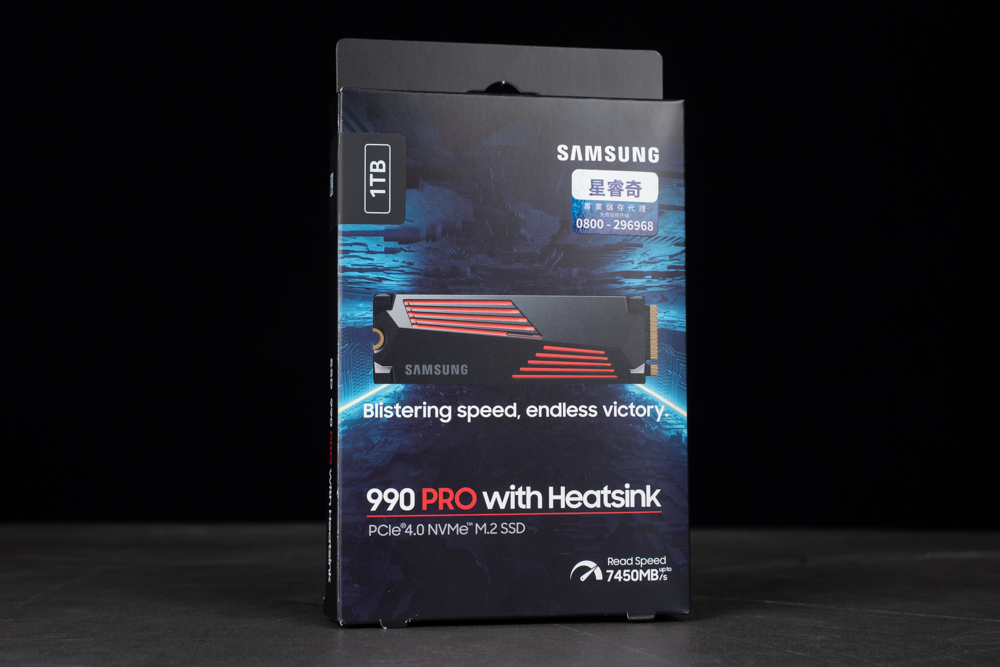
The SAMSUNG 990 PRO adheres to the common M.2 2280 installation specifications for PC platforms, with dimensions including the heat sink of 80 x 22 x 2.3 mm. Given the considerable heat generation during extended read and write operations, high-end PCIe 4.0 NVMe M.2 SSDs are typically recommended to be installed with a heat sink. The SAMSUNG 990 PRO with Heatsink comes pre-equipped with one.
The SAMSUNG 990 PRO operates on a PCIe Gen 4.0 x4 transmission bandwidth and employs the NVMe 2.0 interface standard. It offers a five-year limited warranty with a 600 TBW writing capacity. This means, for the warranty to remain valid, a user would need to write more than 328 GB per day over the course of five years to exceed the specified 600 TBW data limit.
As the manufacturer, SAMSUNG uses its own components for the 990 PRO 1TB, ensuring consistent quality and performance. The main controller chip utilizes an 8nm process Pascal (S4LV008) and an ARM 32bit Cortex-R5 for its processor architecture solution. The controller chip offers eight Flash channels. The DRAM Cache is a 1024 MB SAMSUNG LPDDR4-1866, and the NAND Flash storage particles are 176-layer Samsung V-NAND 3-bit MLC.
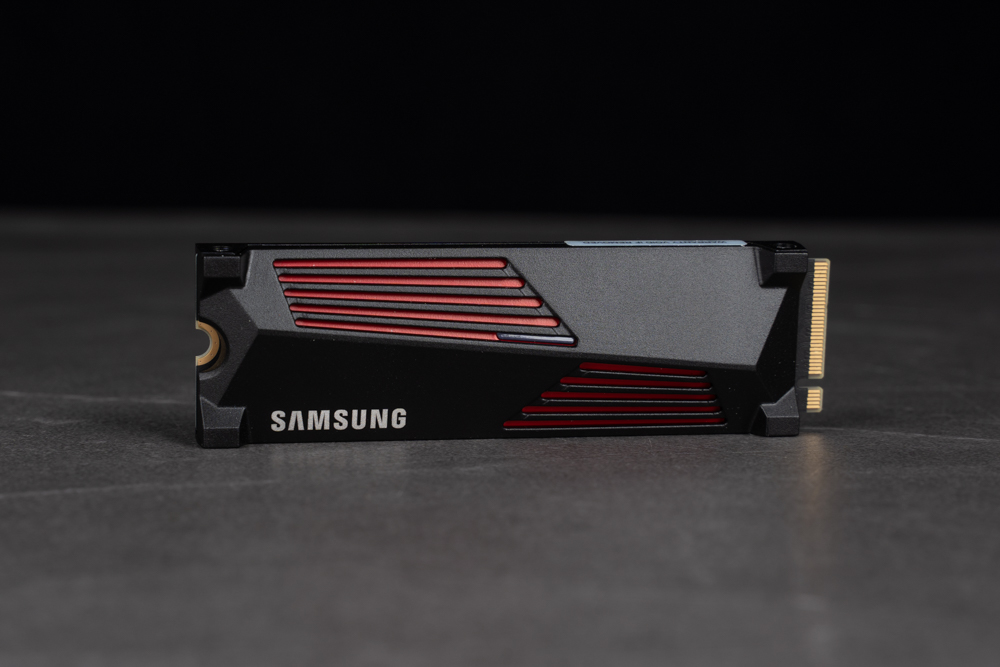
Absolutely! The SAMSUNG 990 PRO SSD, with its M.2 2280 installation specification, is indeed compatible and can be easily installed in a variety of systems including PCs, laptops, and even the PlayStation 5 (PS5)!
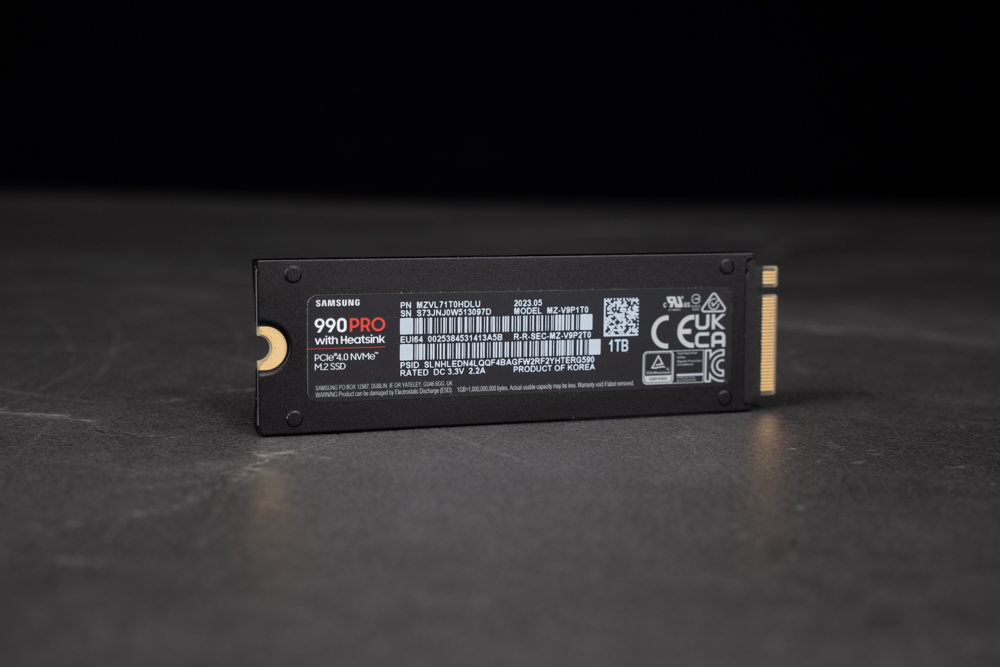
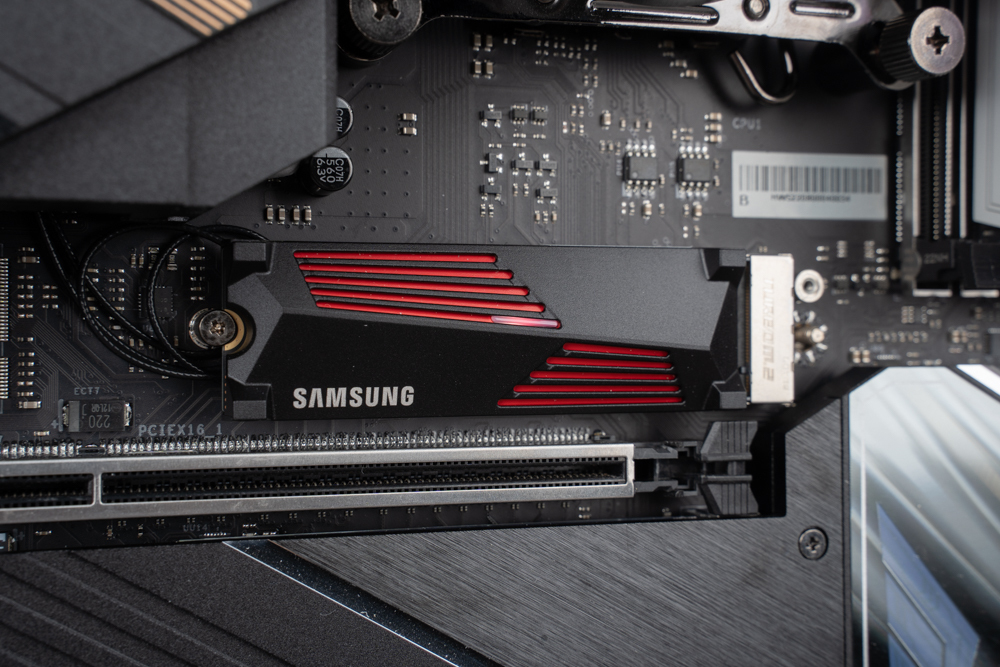
Samsung Management Magician
Samsung Magician, a proprietary control software developed by SAMSUNG, allows users to access primary details about their SSDs. In addition to offering vital insights into the health of the hard drive, it also provides several features including performance benchmarks, optimization tools, disk encryption, and firmware update capabilities.
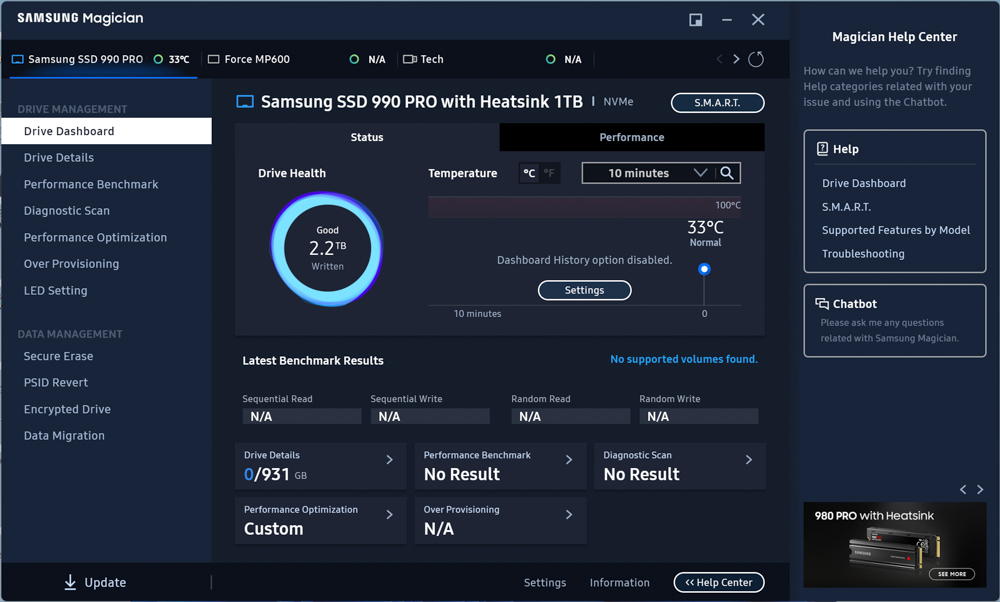
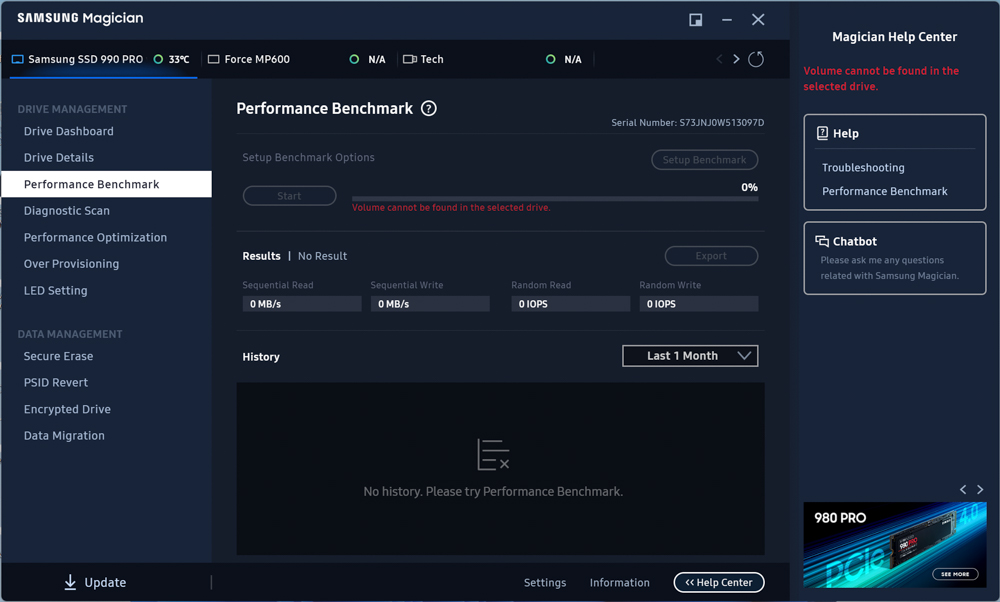
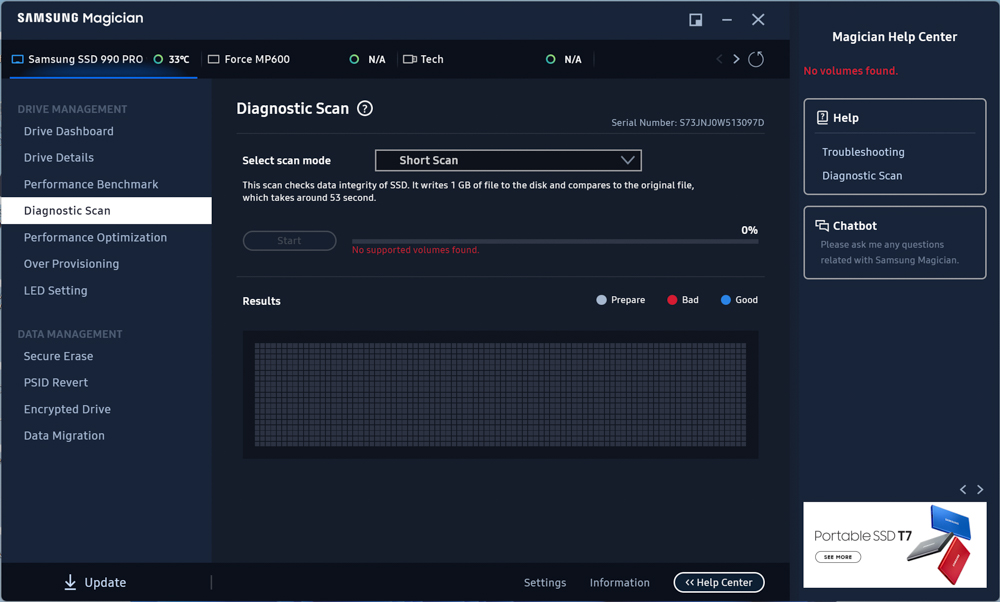
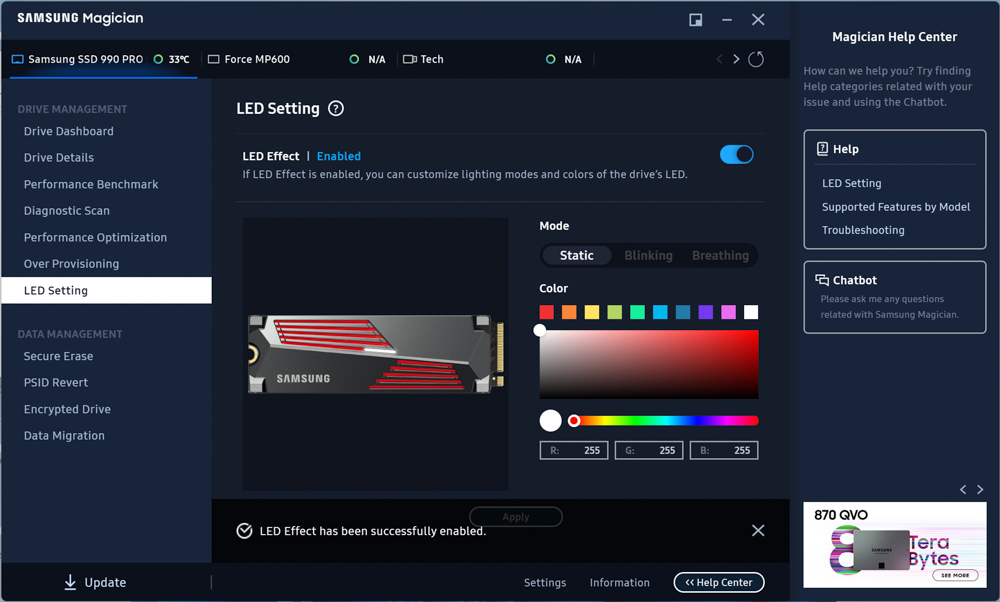
SAMSUNG 990 PRO PCIe 4.0 NVMe M.2 SSD 1TB Performance Test
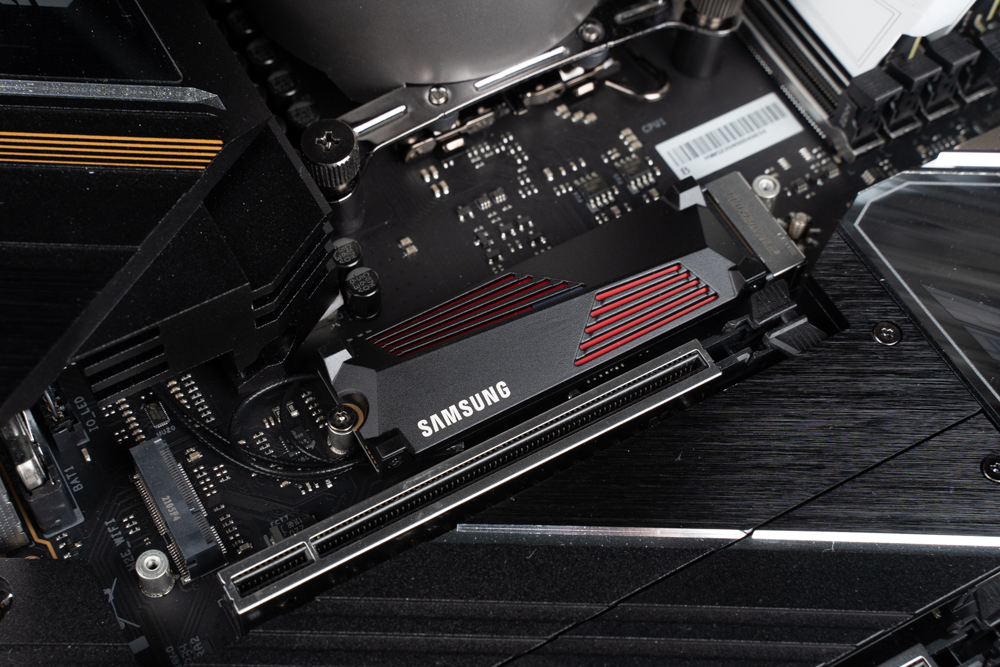
The testing setup includes an Intel i9 13900K processor housed on a BIOSTAR Z790 VALKYRIE motherboard. In the first slot M2M_CPU1 of the motherboard, a SAMSUNG 990 PRO PCIe 4.0 NVMe M.2 SSD 1TB is installed. The platform was set up to measure full PCIe Gen 5 x4 bandwidth performance. However, as the SAMSUNG 990 PRO is a PCIe 4.0 NVMe M.2 SSD, the motherboard automatically adjusts the bandwidth to PCIe Gen 4 x4. The SSD firmware version, system hardware configuration, and other variables can affect the performance of the test. Therefore, these results should only serve as a guide.
Testing Setup Details:
- Processor: Intel Core i9 13900K
- Cooling System: VALKYRIE C360-RGB
- Motherboard: BIOSTAR Z790 VALKYRIE (BIOS version: Z79AC510)
- Memory: T-Force DELTA RGB DDR5 6200 MT/s 16GBx2
- Graphics Card: NVIDIA GeForce RTX 3070 Founders Edition
- Operating System: Windows 11 Professional Edition 21H2
- Test Drive: SAMSUNG 990 PRO PCIe 4.0 NVMe M.2 SSD 1TB (Formatted empty drive)
- System Drive: Corsair MP600 PRO LPX 1TB PCIe Gen4 x4 NVMe M.2 SSD
- Game Drive: GIGABYTE AORUS NVMe Gen4 SSD 2TB
- Power Supply: FSP Hydro G PRO ATX3.0 (PCIe5.0) 850W
- Graphics Card Driver: GeForce Game Ready 536.23
Through CrystalDiskInfo software, we verified the basic information of the SAMSUNG 990 PRO 1TB. It operates using PCIe 4.0 x4 transmission mode and adheres to the NVM Express 2.0 standard. Its functions include SMART, TRIM, and VolatileWriteCache. With the heat sink installed, the idle temperature is 35°C.
The newly updated NVM Express (NVMe) 2.0 series specifications are set to include features like ZNS partition namespace, KV instruction set, and compatibility with different base transmission protocols for both NVMe and NVMe over Fabric (NVMe-oF) technologies. This new protocol, inclusive of mechanical hard drives, could potentially replace the SATA protocol in the future.
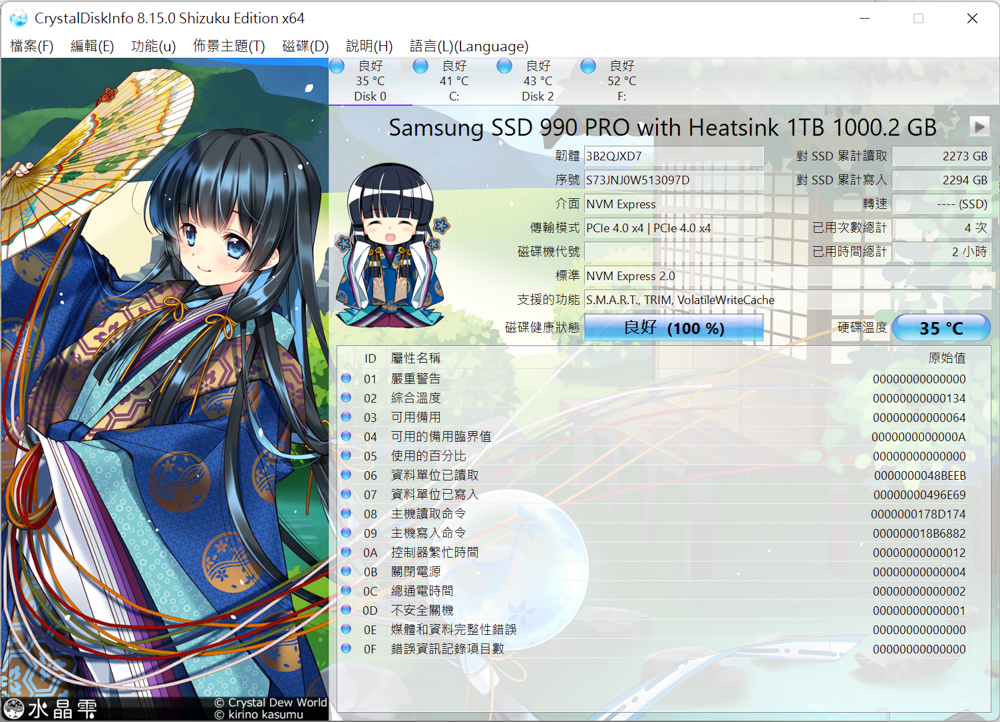
Using the CrystalDiskMark software, the SAMSUNG 990 PRO 1TB was tested under an empty disk state to measure its read and write performance. The test file size was set to 1 GiB by default, yielding read and write speeds of 7131.79 MB/s and 6811.64 MB/s, respectively.
The Q8T1 result displayed in the first column indicates a situation where one thread has eight queue depths, meaning that there are eight 1 MB access items in the task list awaiting completion. This scenario corresponds to the real-world instance of simultaneously reading from or writing to eight different 1 MB files on the hard drive. However, it should be noted that such operations are generally infrequent.
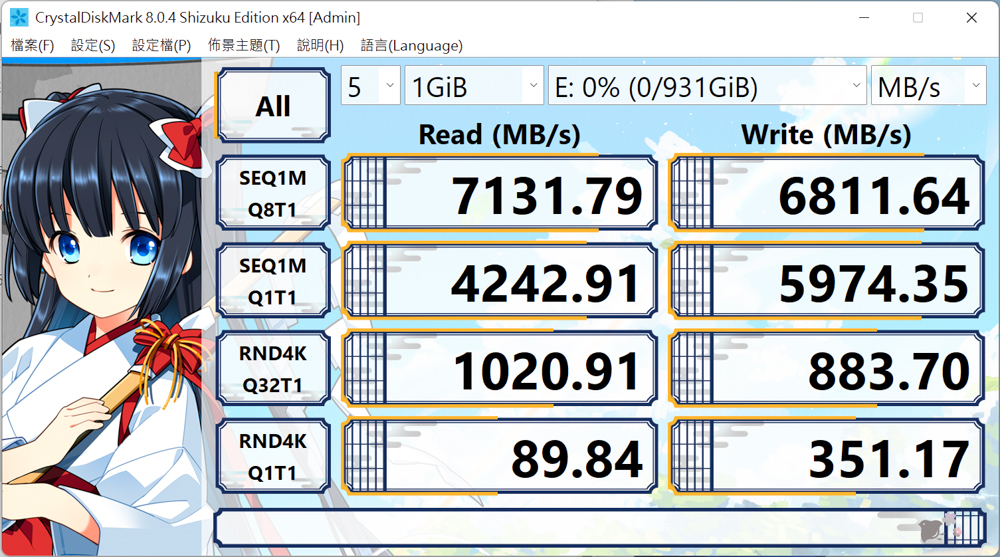
For everyday usage scenarios or for gamers, the range of items from QD1 to QD4 could be more relevant. Adjusting the CrystalDiskMark configuration file to assess real-world performance results in the first column changing to Q1T1. While the output might be slightly lower than Q8T1, the outcomes are more representative of the performance in typical daily usage.
This is because Q1T1, which indicates a single thread handling one queue depth, is the mode that operating systems commonly use in most daily operations. Hence, Q1T1 is more applicable for everyday usage compared to Q8T1. When testing in Q1T1 mode with the test file size set to 1 GiB, the recorded read and write speeds were 4246.31 MB/s and 5977.06 MB/s, respectively.
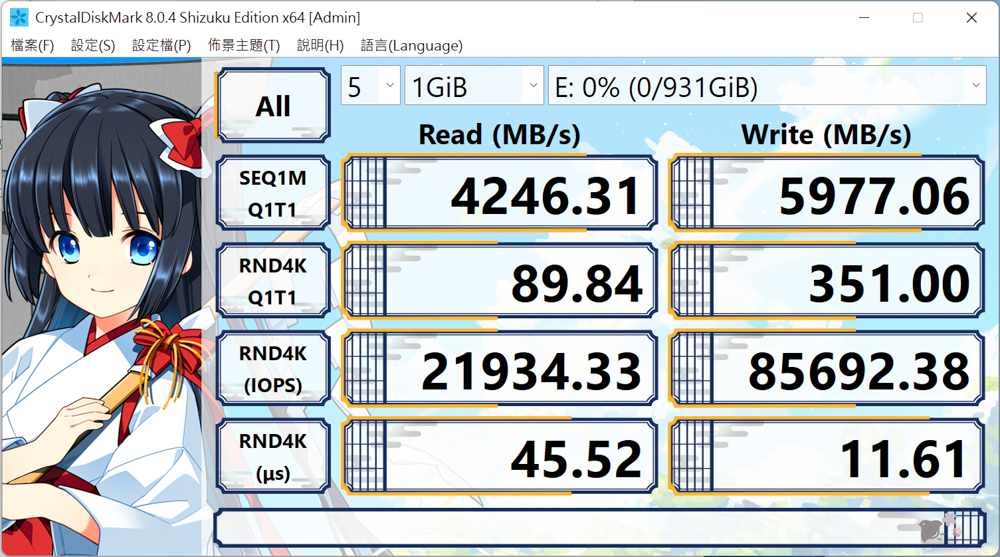
Following that, the CrystalDiskMark random access default project was activated. The results for the RND4K Q32T16 project showed read and write speeds of 1199836 MB/s and 1380277 IOPS. The RND4K Q32T16 operation mode signifies 16 queue depths within 32 execution threads, and it writes or reads files up to 4 KB into the SSD for random access.
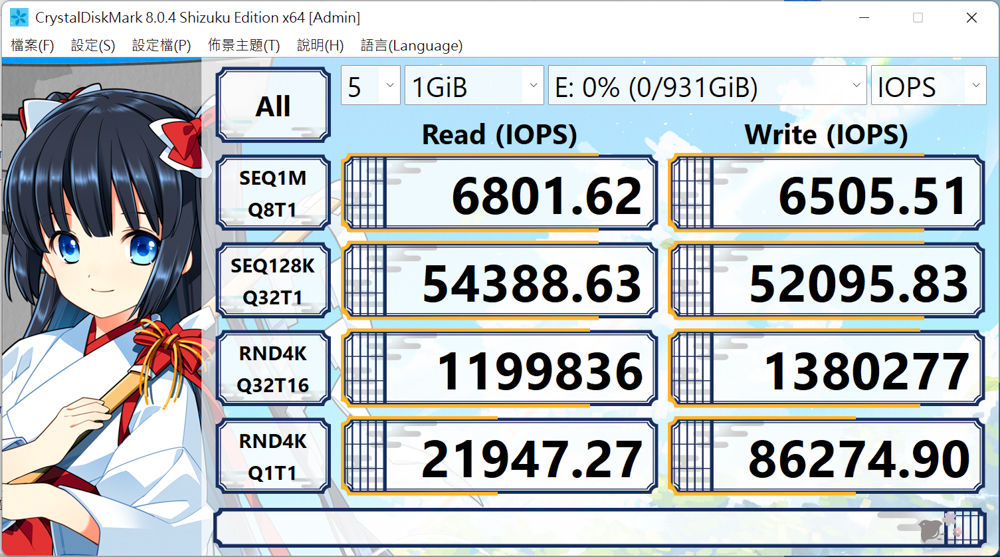
The ATTO Disk Benchmark tool was used next to evaluate the steady and continuous read and write performance of various file sizes. The SAMSUNG 990 PRO 1TB recorded a maximum value of 6.38 GB/s for writing and 6.64 GB/s for reading.
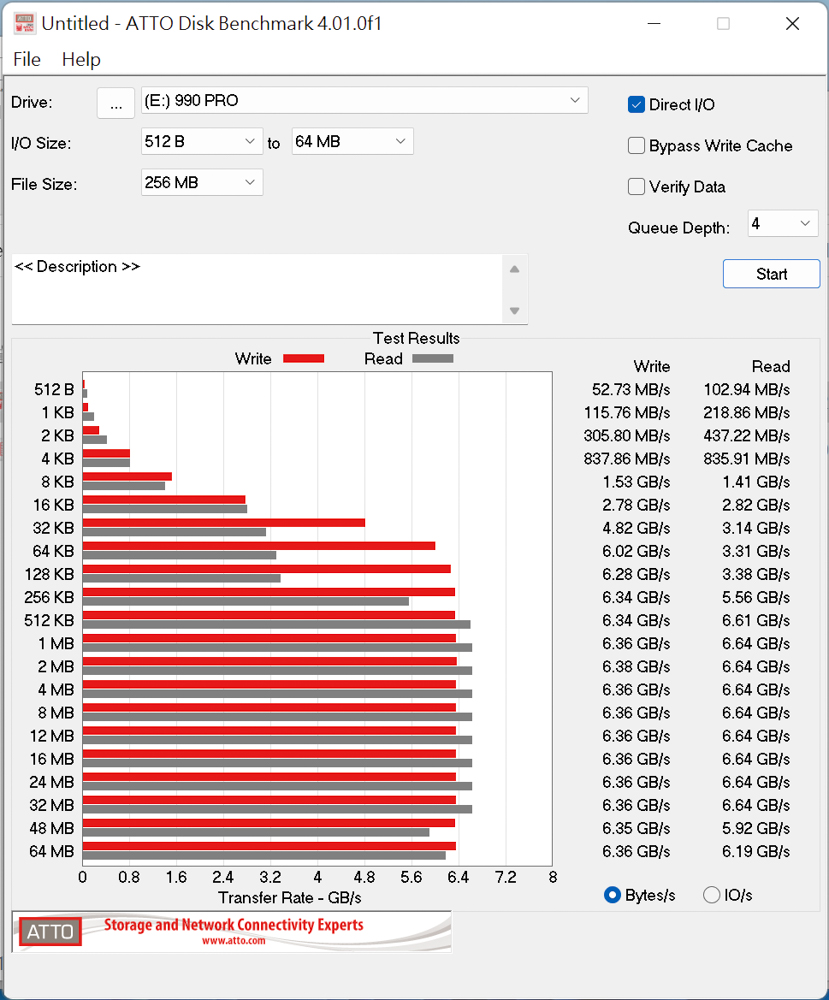
The AJA System Test was used to simulate scenario tests for assessing the performance of reading and writing professional video multimedia files. The test was conducted with a setting of 5120×2700 5K RED format for 64 GB and 1 GB files. The ultimate results showed that for 1 GB files, the write speed was 5511 MB/s and the read speed was 5982 MB/s. For the 64 GB files, the write speed was 5530 MB/s and the read speed was 6169 MB/s.
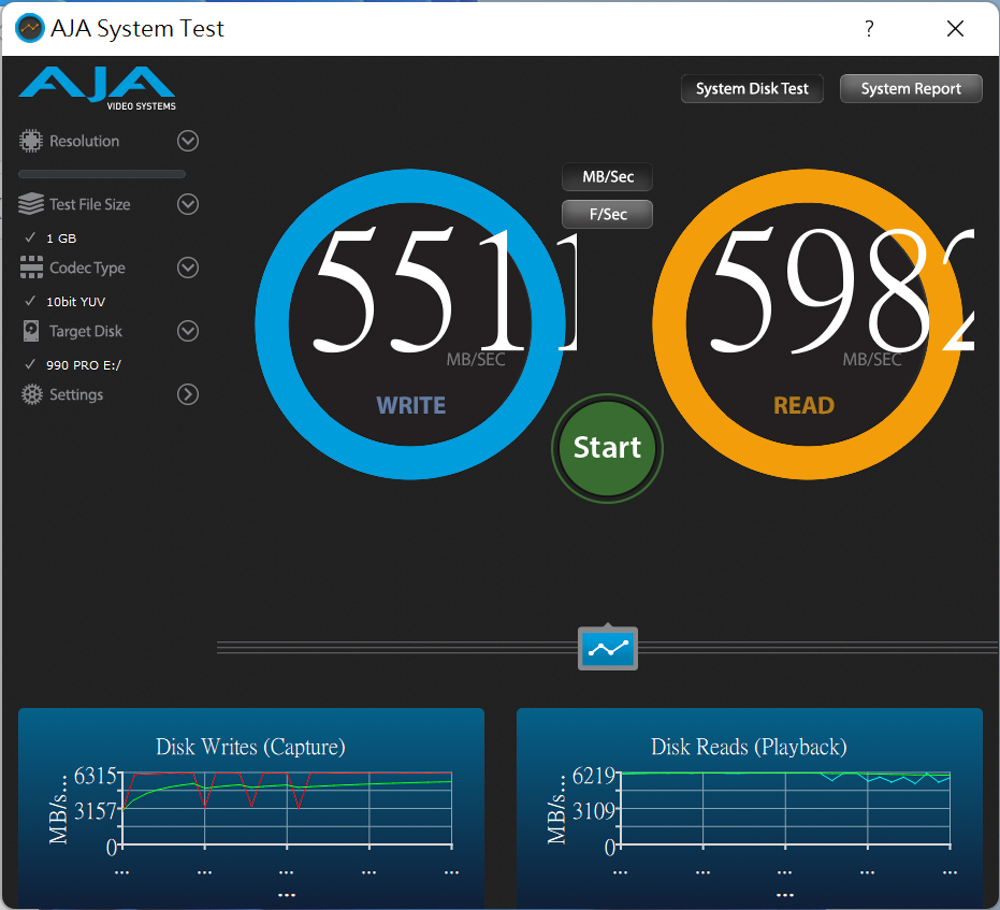
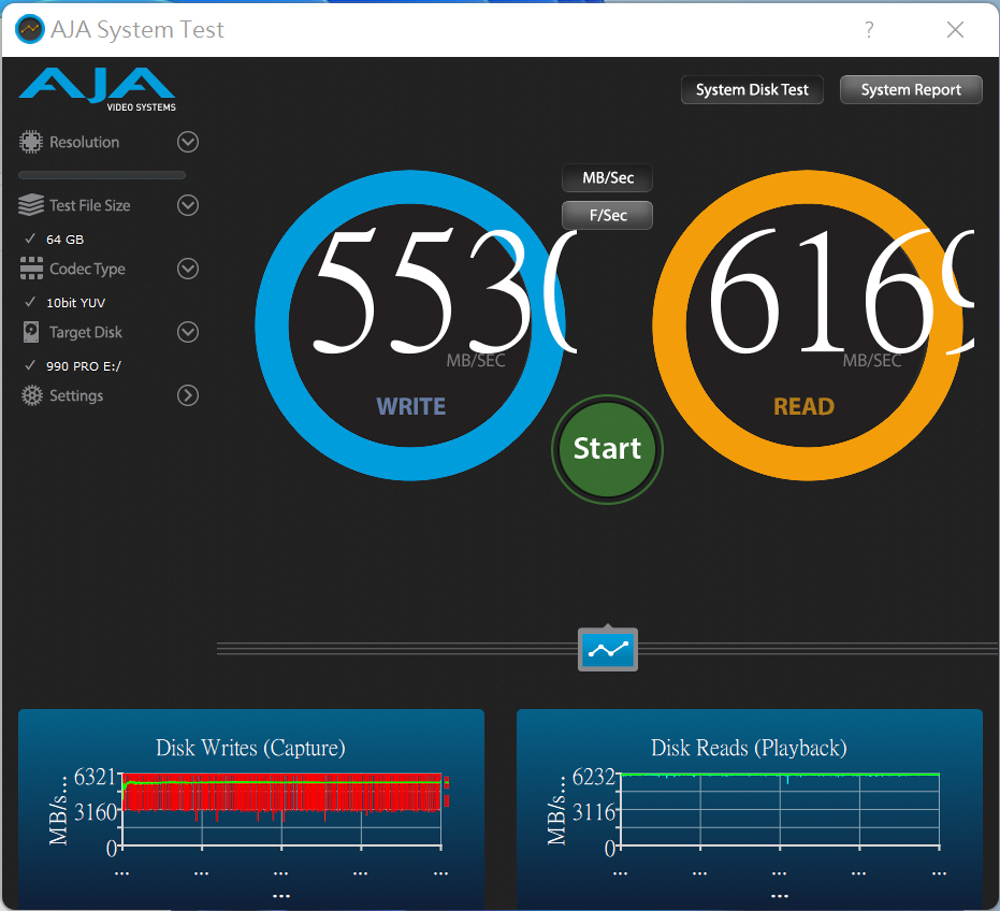
The 3DMark storage benchmark test evaluates the performance by timing several gaming-related processes. These include starting and loading the game, copying the game file, saving the game, installing the game, and recording the game using OBS. While these procedures are tracked in time units, the final score is derived from the bandwidth and average access time. A higher final storage benchmark test score is indicative of superior performance.
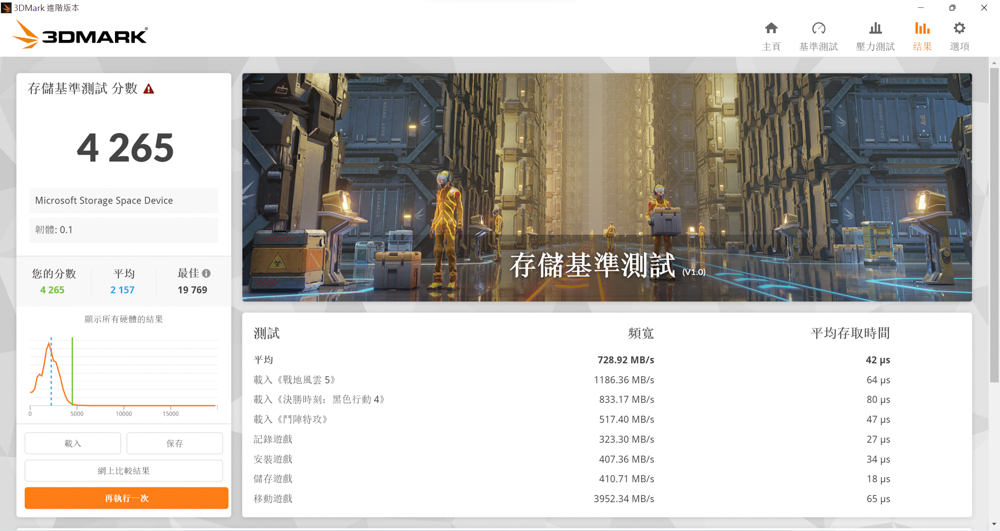
Lastly, AIDA64 is utilized to carry out three specific tests: the Read Test Suite, Linear Read, and Linear Write. The Read Test Suite predominantly evaluates the hard drive’s read performance using methods such as linear read, random read, and cache read.
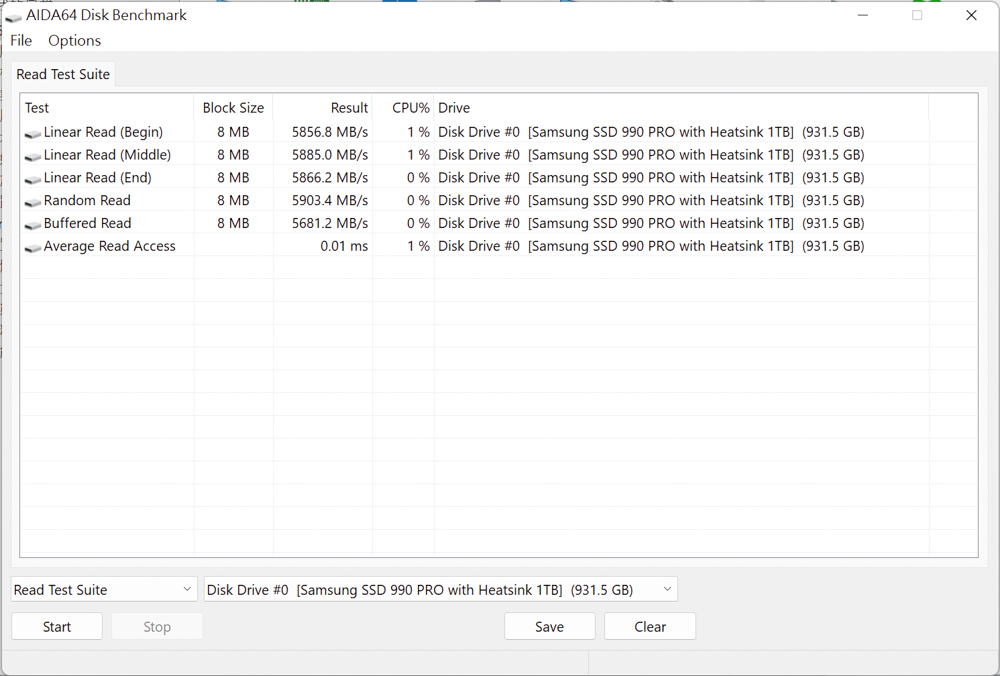
AIDA64’s Linear Read and Linear Write tests conduct full-disk read and write tests with MAX-capacity files, providing users the opportunity to monitor the stability of their reads and writes. The Linear Read test revealed a stable average read rate of 5897.6 MB/s for the hard drive.
During the Linear Write test, the SAMSUNG 990 PRO 1TB’s cache was depleted when it reached the 12% mark, leading to a drop in the write speed to a minimum of 403.3 MB/s. However, it bounced back to around 5500 MB/s after a 5% progress and continued to repeat this pattern until the end. The overall average write speed was 4559.5 MB/s. Therefore, if a user is writing a large file of approximately 120 GB at once, the SAMSUNG 990 PRO 1TB will require some buffering time to restore its original write speed performance.
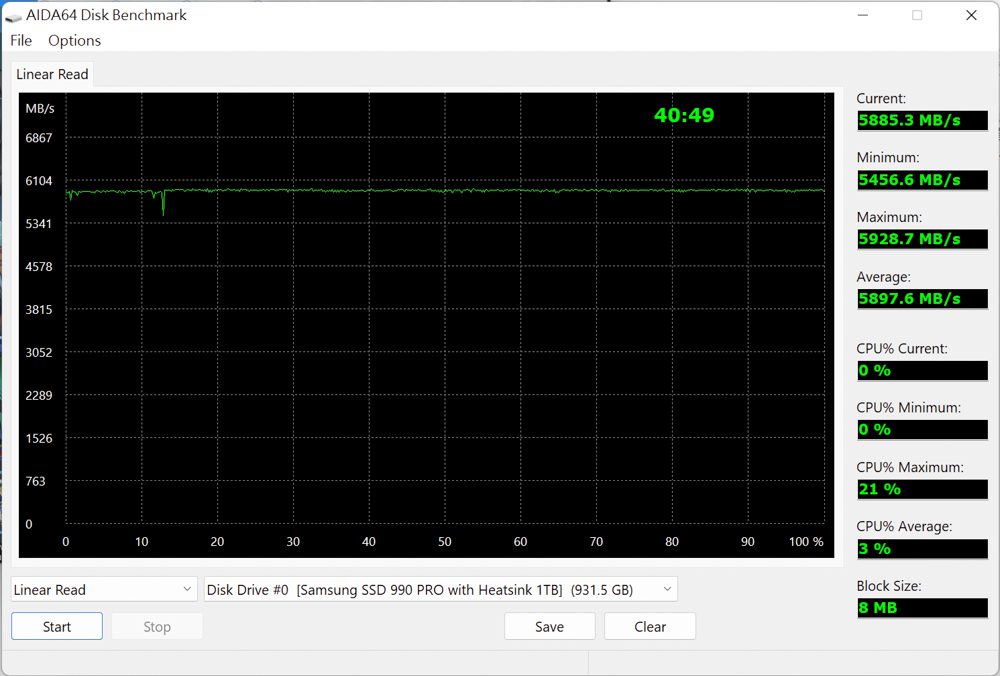
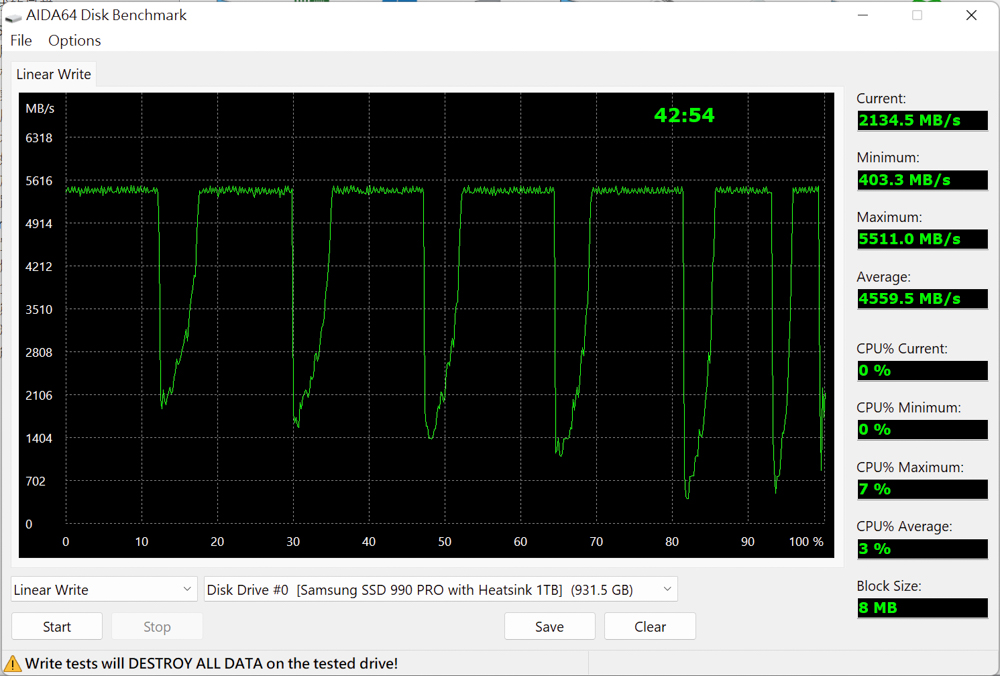
Throughout all the aforementioned tests, the author utilized HWinfo64 software to register the highest temperature of the SAMSUNG 990 PRO 1TB after each test item. HWinfo64 is capable of reading three temperature sensors. The highest recorded temperatures were 43°C for drive temperature 1 (current hard drive temperature), 53°C for drive temperature 2 (ASIC controller), and 51°C for drive temperature 3.
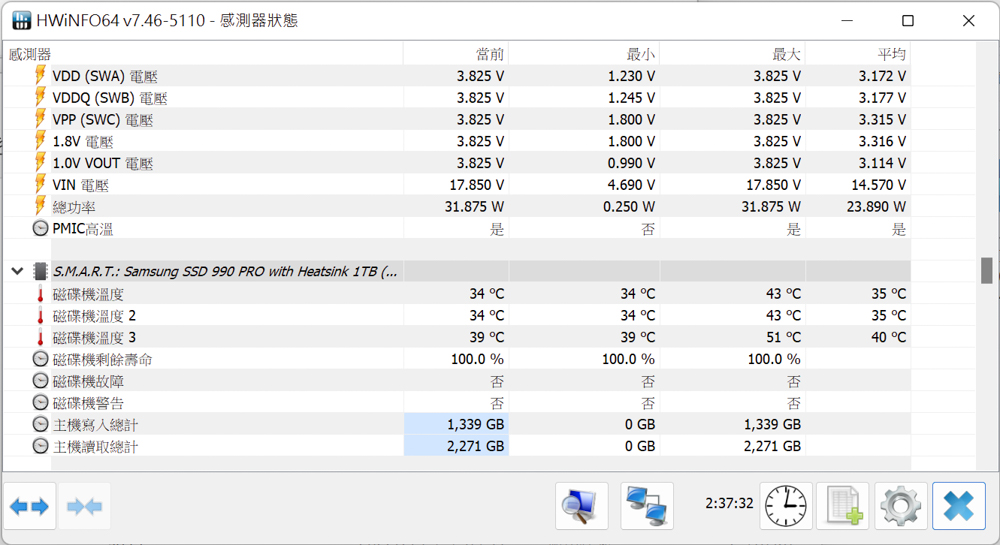
Summary
The SAMSUNG 990 PRO PCIe 4.0 NVMe M.2 SSD is presently offered in two storage capacities of 1TB and 2TB. It was previously declared that a 4TB capacity variant will be released within this year. Presently, the 990 PRO is available in two versions: one with a heat sink and one without. The choice between these versions largely depends on the user’s installation platform. If the motherboard or the device does not have its own heat sink configurations, the user may consider the SAMSUNG 990 PRO version with a heat sink, as showcased today.
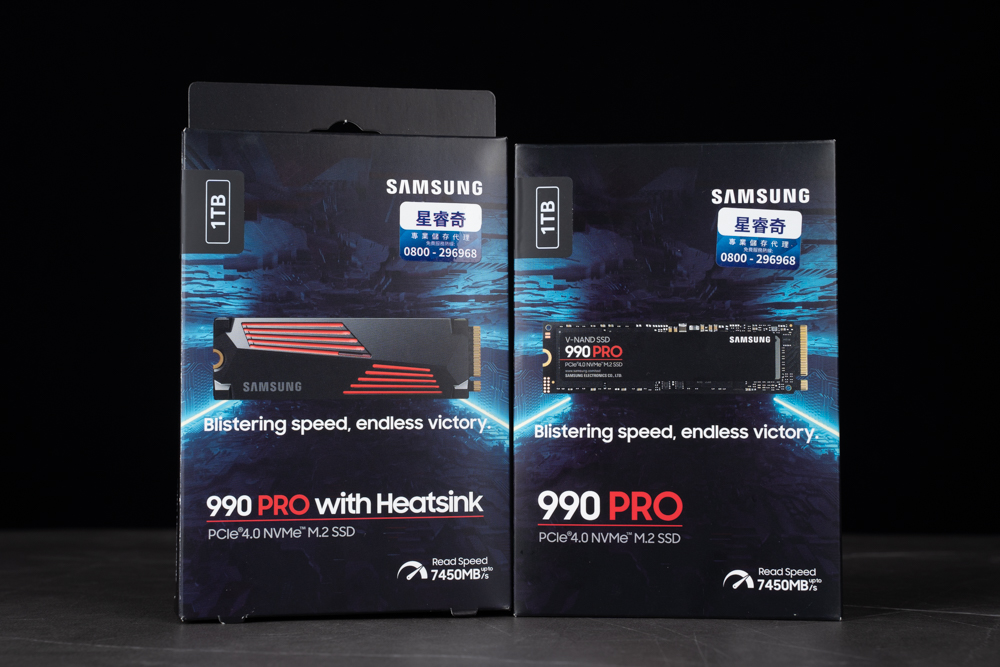
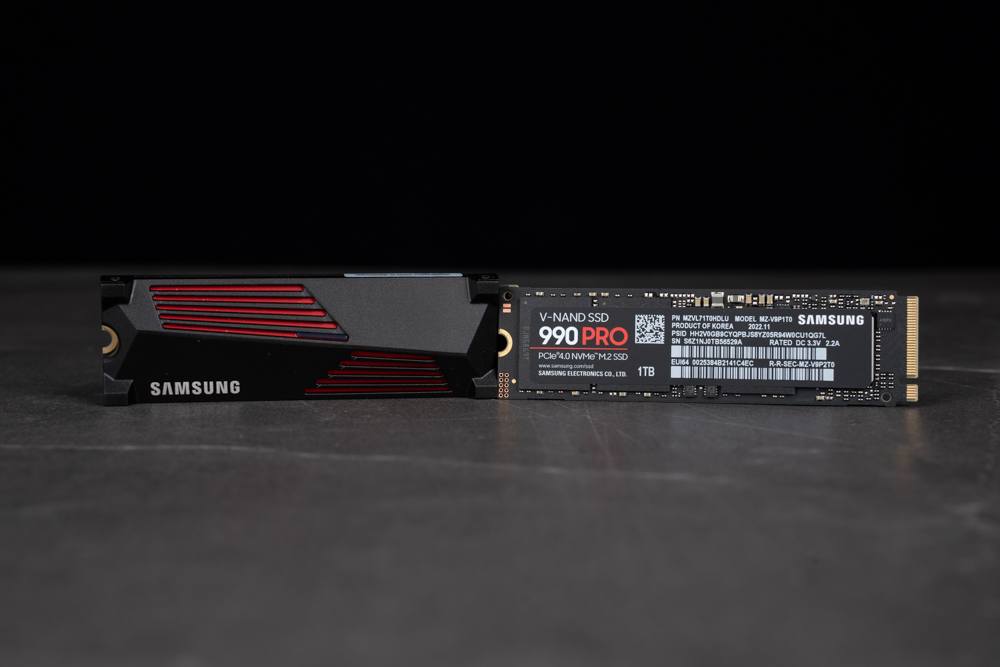
The SAMSUNG 990 PRO has an average power consumption of 5.5 W, peaking at 8.5 W in burst mode. It offers 50% greater performance per watt compared to the 980 PRO. This optimization results in the 990 PRO generating less heat while still providing stronger sequential read and write performance. Throughout a series of tests, the maximum temperature of the SAMSUNG 990 PRO 1TB didn’t exceed 51°C, which is excellent for a PCIe 4.0 NVMe M.2 SSD!
In a variety of tests, despite the Intel i9 13900K platform not achieving the official stated read speed of 7540 MB/s and write speed of 6900 MB/s, it still accomplished a read speed of 7131 MB/s and a write speed of 6811 MB/s. The author discovered that SAMSUNG uses an AMD platform comprised of the AMD Ryzen 7 5800X and ASRock X570 Taichi after researching information on the official website. Therefore, it’s inferred that the AMD platform might reach the advertised speeds.
The SAMSUNG 990 PRO’s sequential read performance can reach up to 7540 MB/s, nearly matching the theoretical maximum sequential read of 8000 MB/s of PCIe 4.0. Its highest random read and write speed is 1,550,000 IOPS, an industry-leading figure. In conclusion, the 990 PRO appears to be SAMSUNG’s final and most powerful offering among PCIe 4.0 NVMe M.2 SSD products. If this interests you, consider giving it a look!
If this article is helpful for you, please share this article with your friends on social media. Thank you!
This article is based on the personality of the reviews. You are responsible for fact-checking if the contents are not facts or accurate.
Title: Unboxing review of the 1TB SAMSUNG 990 PRO M.2 SSD with PCIe 4.0 NVMe, boasting advanced heat sink technology for temperature control and voltage stability, preventing overheating